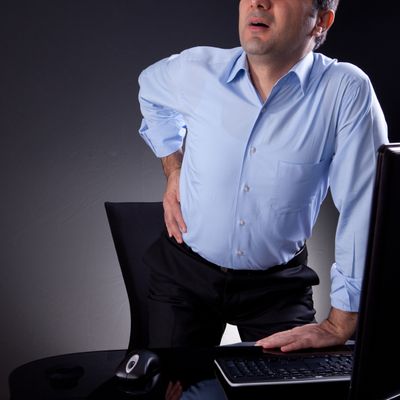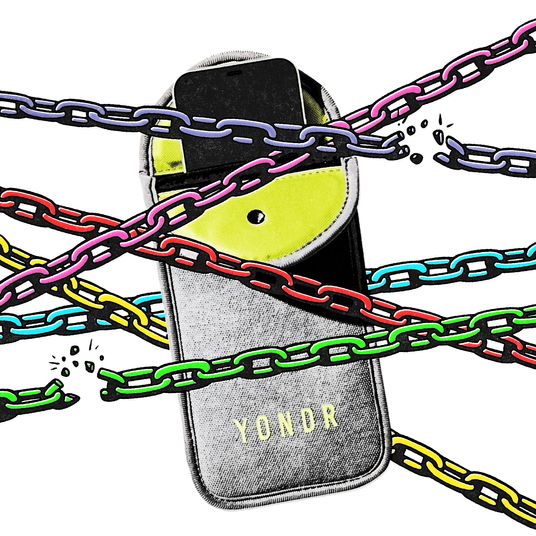
I keep seeing headlines about how sitting all day will give you heart disease. I work at a desk from 10 a.m. till 8 p.m., five days a week; am I really going to die an early death? And please, don’t tell me to get a standing desk — not going to happen.
I’m sorry to say that you heard right; this is a real phenomenon. And here’s the really bad news: Studies have shown that prolonged sitting is an independent risk factor for that early death you’re worried about. That means that it’s irrespective of your other physical activity — even if you exercise five days a week and walk to and from work, if you sit at your desk for more than six hours a day, your risk of death by heart attack, stroke, and heart disease goes up significantly.
Why? So far science has only given us one answer, which I think is B.S.: In rats, a certain fat-destroying hormone called lipoprotein lipase is ten times lower when sitting compared to standing. But that hasn’t been shown in any human studies, and until someone shows me that lipoprotein lipase goes up tenfold in people when they stand up, I’m not buying it.
Still, the risk is real. If you’re not going to embrace the standing desk thing, you need to periodically get up from your computer, even just for a few minutes. Break up that inactivity as much as you can — fidget in your chair, tap your feet, stand up and dance, walk around. Finally, the good news: A few minutes of movement every hour is a reasonable, attainable goal.
—Dr. Steve Rucker, internist at St. Francis Hospital
My wife drinks soy milk. I use skim milk on my cereal. Who’s smarter?
We’ll wager she is. But let’s consider your question.
“Soy milk and skim milk are pretty much the same, nutritionally,” says Dr. Robert C. Kurtz, chief of Gastroenterology and Nutrition Service at Memorial Sloan Kettering Cancer Center. Both usually have about the same amount of calories, and both have added sugars and vitamin D. Soy milk often has added calcium.
That won’t settle the blood-feud raging over your breakfast table. But this might:
“If your wife is drinking soy milk because she thinks it will help prevent breast cancer, or is otherwise healthier than cow’s milk, there’s no evidence to support that,” says Kurtz, an admitted skim-milk man (“I get the kind without bovine growth hormone,” he confides).
Most people believe soy milk has health benefits because Asians — who eat a diet rich in soy — have lower rates of breast cancer, heart disease, and other diseases.
“But there are too many other lifestyle factors to know if soy is actually causing these benefits,” says Kurtz. “If soy is imparting these benefits, remember that they’ve been eating it since birth — and there’s no reason to think that drinking soymilk in your twenties or eating tofu occasionally will have any effect.”
To get technical, there’s even a tiny, theoretical reason why your wife may want to come over to the white side.
“Soy contains plant-based phyto-estrogens, which act much the same way in the body that estrogen does,” explains Kurtz. While there’s no hard evidence that shows any actual risk, Kurtz says that he would not be overjoyed to see a woman of childbearing age guzzling down soy milk by the half-gallon every day.
“There is the thought that it could, theoretically, cause a hormone disruption due to the effect of the phyto-estrogens,” he explains.
This does not mean that drinking soy milk poses any dangers, or that it can grow breasts in men, says Kurtz. It just means that the girly juice in soy makes some MDs stroke their chins. So unless you’re lactose-intolerant, don’t let anyone talk you out of your boring skim milk. Got it?
I’ve recently started having panic attacks. The weird thing is, there’s nothing really wrong with my life, as far as I can tell. I haven’t been any busier or more stressed than usual. Why is this happening?
A mysterious panic attack is like a fever. It’s a symptom and it has many possible causes. Getting to the root is usually a process of elimination.
If you’re having true panic attacks — meaning a period of intense fear during which you might have heart palpitations, nausea, dizziness, chest pain, sweating, hot flushes, and shortness of breath — see your doctor to get a diagnosis, naturally. A psychiatrist can also coordinate the care.
To start, we need to rule out any biological causes. Medications (like albuterol and prednisone) and substance abuse (with alcohol, marijuana, or cocaine) may increase the risk of panic attack. So can heavy use of stimulants like caffeine. We’d look at your genetic history, and do tests to check for heart problems, thyroid and adrenal gland issues, hypoglycemia, abnormal calcium levels, and many other factors.
If the tests don’t find anything, you need to take a closer look at your environment. When I see a person with unexplained panic attacks, it’s often because several different stressors are having a cumulative effect.
Each stressor, alone, may be something you can easily handle — like a fight with your spouse or some hassle at work. So you might think they’re too minor to cause panic attacks. But each person has a different total capacity for stress, which is determined by our genetics and our environmental development. Every small stressor, good or bad, takes up space. If you hit your tipping point, it can trigger a panic attack.
Given that we have more constant stressors now than we did fifteen years ago — like the economy and terrorism — it might be easier to hit that tipping point.
I also see people who have panic attacks as a delayed reaction to a trauma. Let’s say you lost your mother two years ago and handled that fairly well. Today, you get into a minor argument with your sibling and then have a panic attack. If your mother was the peacemaker, this may be the first time you feel the full impact of her not being here.
Whatever the cause, there are good treatments for panic attacks, so make sure you address this.





























